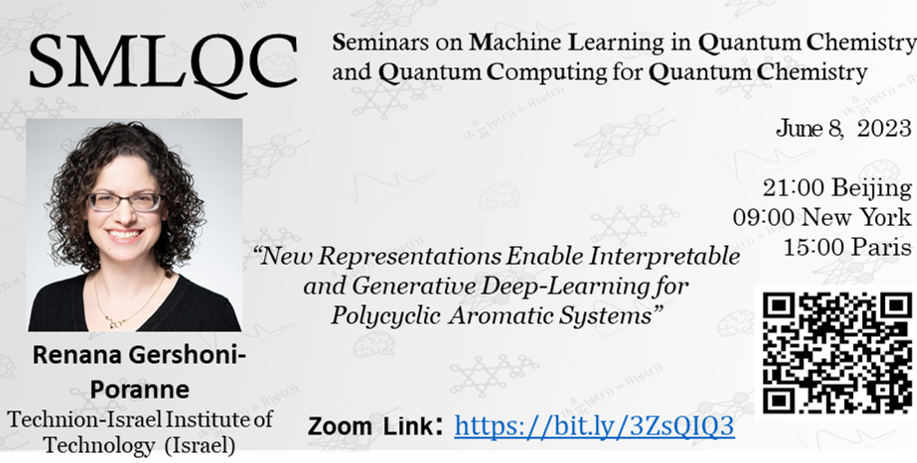The 8th SMLQC seminar will be given by Renana Gershoni-Poranne on June 8, 2023 (15:00 Paris | 21:00 Beijing | 09:00 New York).

Title
New Representations Enable Interpretable and Generative Deep-Learning for Polycyclic Aromatic Systems
Abstract
Polycyclic Aromatic Systems (PASs) – molecules made up of multiple aromatic rings – are highly important for a variety of functionalities, in particular organic electronics. The structure-property relationships of PASs have both conceptual and practical implications; understanding them can enable design of new functional compounds and elucidation of reactivity in a broader context.
To investigate these relationships in a data-driven manner, we generated a new database – the COMPAS Project1 – which contains the calculated structures and properties of all polybenzenoid hydrocarbons consisting of up to 11 rings, and a sampling of ~500k PAS molecules consisting of 11 types of aromatic and antiaromatic building blocks.
We also developed and implemented two types of molecular representation to enable machine- and deep-learning models to probe the new data: a) a text-based representation2 and b) a graph-based representation.3
In addition to their predictive ability, we demonstrate the interpretability of the models that is achieved when using these representations. The extracted insight in some cases confirms well-known “rules of thumb” and in other cases disproves common wisdom and sheds new light on this classical family of compounds. In addition to corroborating domain-experts’ interpretation, the different models also highlight additional relationships that are harder for the human eye to discern.
Finally, we designed and implemented a generative model, GaUDI,4 that uses our new data and representations to successfully design new PASs with targeted properties. GaUDI achieves exceptionally high validity and manages to generate molecules with properties beyond the distribution of the original data set.
References
- Wahab, A.; Pfuderer, L.; Paenurk, E.; Gershoni-Poranne, R. The COMPAS Project: A Computational Database of Polycyclic Aromatic Systems. Phase 1: Cata-Condensed Polybenzenoid Hydrocarbons. J. Chem. Inf. Model. 2022, 62 (16), 3704. https://doi.org/10.1021/acs.jcim.2c00503.
- Fite, S.; Wahab, A.; Paenurk, E.; Gross, Z.; Gershoni-Poranne, R. Text-Based Representations with Interpretable Machine Learning Reveal Structure-Property Relationships of Polybenzenoid Hydrocarbons. Journal of Physical Organic Chemistry 2022, e4458. https://doi.org/10.1002/poc.4458.
- Weiss, T.; Wahab, A.; Bronstein, A. M.; Gershoni-Poranne, R. Interpretable Deep-Learning Unveils Structure-Property Relationships in Polybenzenoid Hydrocarbons. 2022. https://doi.org/10.26434/chemrxiv-2022-krng1.
- Weiss, T.; Cosmo, L.; Yanes, E. M.; Chakraborty, S.; Bronstein, A. M.; Gershoni-Poranne, R. Guided Diffusion for Inverse Molecular Design. ChemRxiv April 5, 2023. https://doi.org/10.26434/chemrxiv-2023-z8ltp.
Introduction to the speaker
Renana Gershoni Poranne is an Assistant Professor of Computational Chemistry at the Schulich Faculty of Chemistry at the Technion-Israel Institute of Technology, where she is a Branco Weiss Fellow, Horev Fellow, and Alon Scholarship recipient. Her appointment began in October 2021.
Before joining the faculty at the Technion, Renana was a Senior Scientist (Group Leader) in the group of Prof. Dr. Peter Chen at the Laboratorium für Organische Chemie at the ETH Zürich. Her promotion to Senior Scientist and Lecturer in July 2017 followed a two-year post-doctoral period (as a VATAT postdoctoral fellow) in the same group. She completed her PhD studies under the supervision of Prof. Amnon Stanger in the Schulich Faculty of Chemistry at the Technion, working on elucidation of the properties of aromatic compounds and developing methodologies for the identification and quantification of aromaticity in polycyclic aromatic hydrocarbons. Prior to that, she received her MSc Summa cum Laude for her work on functionlization of corannulene in the group of Prof. Ehud Keinan.
Renana’s research interests lie in the field of computational physical organic chemistry, with particular emphasis on development of methods and tools for better understanding of the physical properties and reactivity of organic and organo-metallic compounds. The work in her group ranges from investigation of fundamental molecular properties and concepts—such as aromaticity, dispersion, metallophilic interactions, catalysis, and mechanism elucidation—to application of machine-learning and deep-learning models for molecular design of novel polycyclic aromatic systems and discovery of structure-property relationships.
How to join
Join Zoom Meeting
https://zoom.us/j/86004422973?pwd=WjNKQlEydmdFL3hJbUx4NjByYjVJZz09
Meeting ID: 860 0442 2973
Passcode: 703098